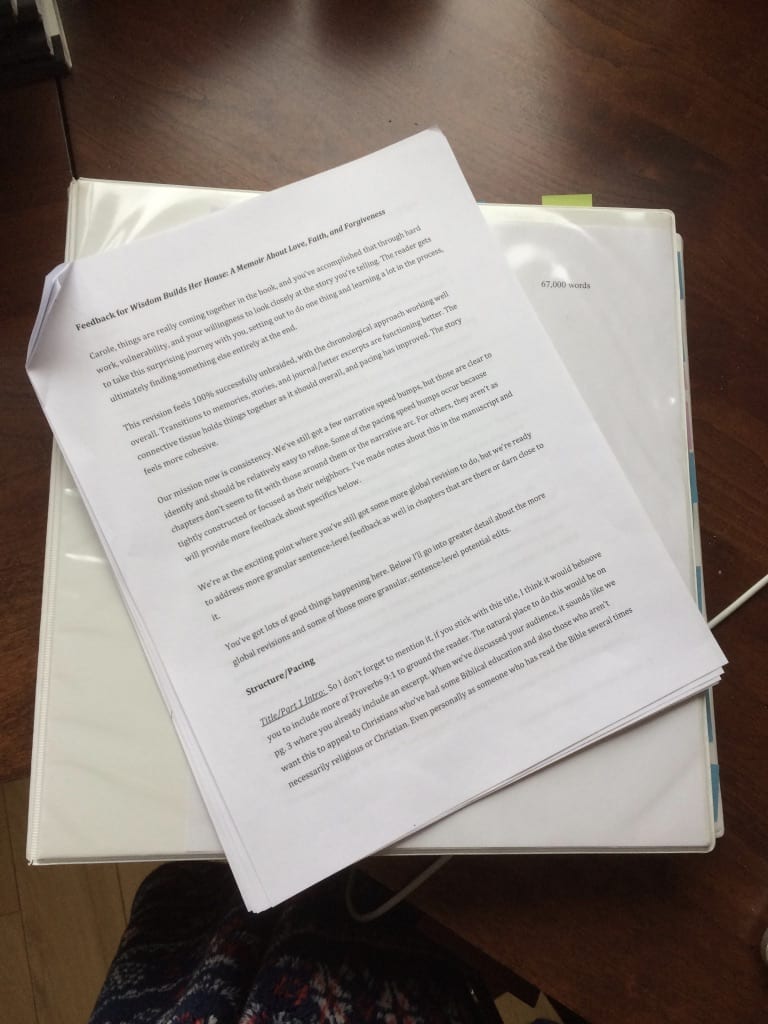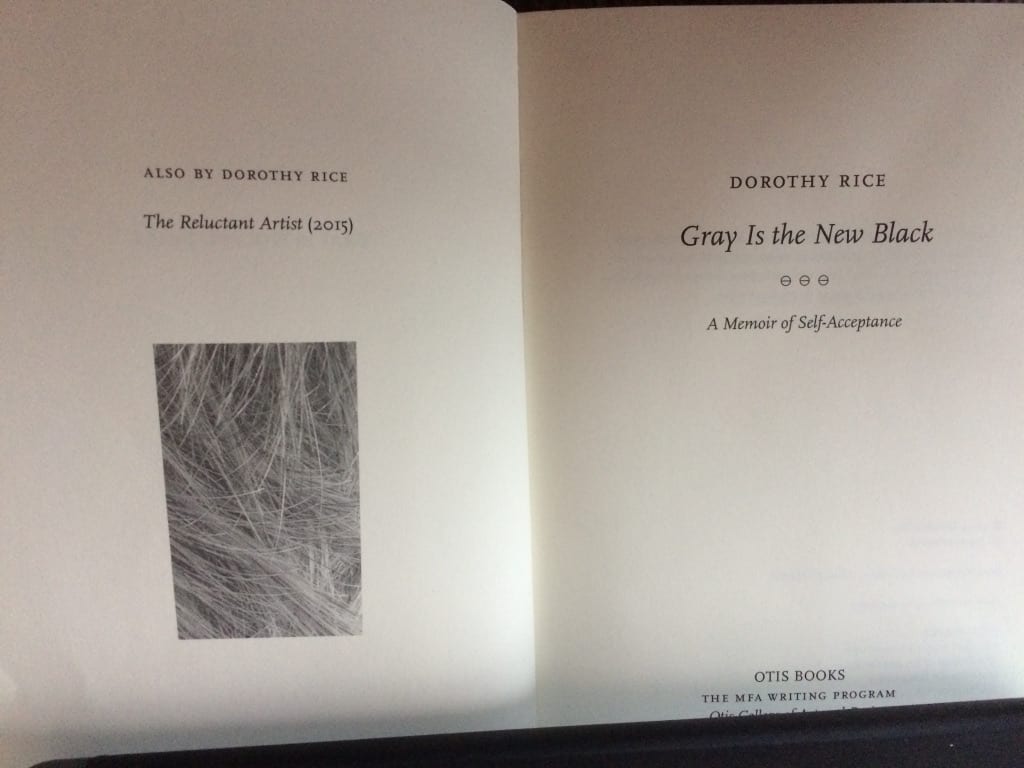 I sat across the table from my editor at Panera in Barracks Road Shopping Center. We’d met for lunch and to debrief her review of my faith memoir. I came prepared with points for discussion about the twelve of forty chapters she’d noted, those not fully connected to the narrative arc.
I sat across the table from my editor at Panera in Barracks Road Shopping Center. We’d met for lunch and to debrief her review of my faith memoir. I came prepared with points for discussion about the twelve of forty chapters she’d noted, those not fully connected to the narrative arc.
She opened our discussion by congratulating me on my progress. Almost ready for first-round beta readers, she said. Then she issued a caution.
“Be careful not to talk too negatively about yourself—it dismisses the reader’s feelings, too. Look back from where you are now to provide context. You want vulnerability, not judgment.”
I nodded. Hope is a major challenge for memoir writers, I said, and gave an example.
In Gray is the New Black: A Memoir of Self-Acceptance, Dorothy Rice decides to let her glorious, long black hair go grey. Going “natural” becomes part of a one-year project to examine her real self now that her last child has left for college. Why not improve her marriage, lose weight, and write a memoir, too?
She writes about her abusive past, her unsatisfying relationship with her husband, her addiction to sugar and obsession with body image. A great deal of the book’s real estate is taken up by the author’s self-loathing.
Let’s be clear. Dorothy Rice is gorgeous—check out the headshot on her website—and much loved. But she’s not convinced that anyone could accept her the way she is. She sets weight-loss goals and, after dramatic losses and gains, ends where she started. Nothing changes except her hair color. She completes a manuscript in which she learns what she already knows. She is loved, and she’s relentlessly herself.
“The book was drafted in 2017 and published in 2019,” I said to my editor. “I think the author might have benefited from more time and distance from her negative feelings. As a reader, I became discouraged and almost gave up on the book, which is rare for me because I like to finish what I start.”
My editor nodded and smiled. We are both finishers and people of faith and thus know how easy it is to see the sliver in someone’s eye rather than the log in our own. So, we dug in.
“What work is chapter four doing,” she asked, “and how does it tie to the journey of self-discovery? How does this section in chapter eleven fit the narrative? Give space for reapportioning these early chapters, cutting them up and maybe placing them differently. Components in a few of the later chapters I flagged are too episodic and need to be stitched together with a little more connective tissue.”
I scribbled notes for the revision I’ll tackle after the holiday.
 Driving home after our meeting, I had a thought about the subtitle to Gray is the New Black: A Memoir of Self-Acceptance. Is self-acceptance possible without outside help? Without faith and community, aren’t we relentlessly ourselves, wanting love but drawing away and ending up where we started, struggling with hope?
Driving home after our meeting, I had a thought about the subtitle to Gray is the New Black: A Memoir of Self-Acceptance. Is self-acceptance possible without outside help? Without faith and community, aren’t we relentlessly ourselves, wanting love but drawing away and ending up where we started, struggling with hope?
More logs in my eye to ponder during this second week of Advent—and in the new year.
Click link to view this post on YouTube:
https://www.youtube.com/watch?v=DSkpY-PbAqM&feature=youtu.be



“Is self-acceptance possible without outside help?” For a Christian, I would answer “No,” for we are dependent on our Lord to discover and to accept who he has made us to be. Is it possible without community? Yes! I am living proof of that. We can come to see ourselves through God’s eyes for who he made us to be regardless of whether or not others accept us for who God made us to be. We can even have lots of people against us, and criticizing us, slandering us, gossiping about us, saying mean and hateful things, and rejecting us for who God made us to be, and we can still accept who God created us to be because He loves us, and He made us, and He called us to himself for his purposes and for his glory and praise.
I enjoyed reading about the process you are going through in writing your story. That was interesting. I have never written anything for publication that got published that had to be scrutinized by someone else. That takes a lot of courage. I hope it all turns out for you in a way that will be for the benefit of others.
Thank you for your comment, Sue. Though I have much to learn, so far I’ve discovered how essential community is for me to mature in faith and grow as a writer. I need feedback from wise mentors. And, since I’m a teacher by calling, what I do I do for others.
Yes, we do need community, but we can’t put our dependency in people. They won’t always be there for us. God wil always be there. It is wonderful when we have the encouragement of the body of Christ, but sometimes they abandon us and turn against us. God never will. If our dependency is on humans, then when they desert and betray us, we fall apart. So our dependency has to always be in the Lord. But community is wonderful when it works.
Carole, your dedication to this project is inspiring. Best wishes!
I have thought of publishing my best efforts in poetry and short stories, but the idea is more of a dream than a goal.
Thank you! I wish you well with your writing. -C.D.
Oh, yes–we DO need community–as part of self-acceptance, as part of becoming what God would have us to be. He OFTEN chooses to minister through His people. A pastor we know says we’re “Jesus with skin on” for each other. Numerous times the prayer, encouragement, inspiration, or challenge from a fellow Christian has been just what I needed in that moment.
Thank you for your comment, Nancy. That’s been my experience, too. That is, God is in community.
Thanks for reading GRAY IS THE NEW BLACK, or at least portions of it 🙂 – while our approaches to, and beliefs about, the nature of faith and community may differ, both guide and support me, and my writing. One of the fascinating aspects of putting our writing out into the world is the varied responses and takeaways for different readers. I appreciate yours. Best wishes, Dorothy
Thank you, Dorothy, for reading my blog post—and I read all of your book, which has me pondering still. I guess we never really know who we’re writing for, though clearly your writing struck a chord.